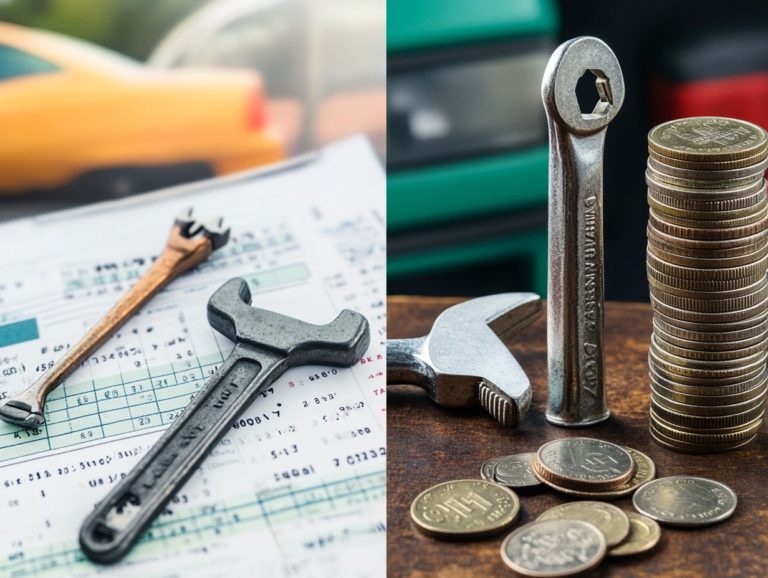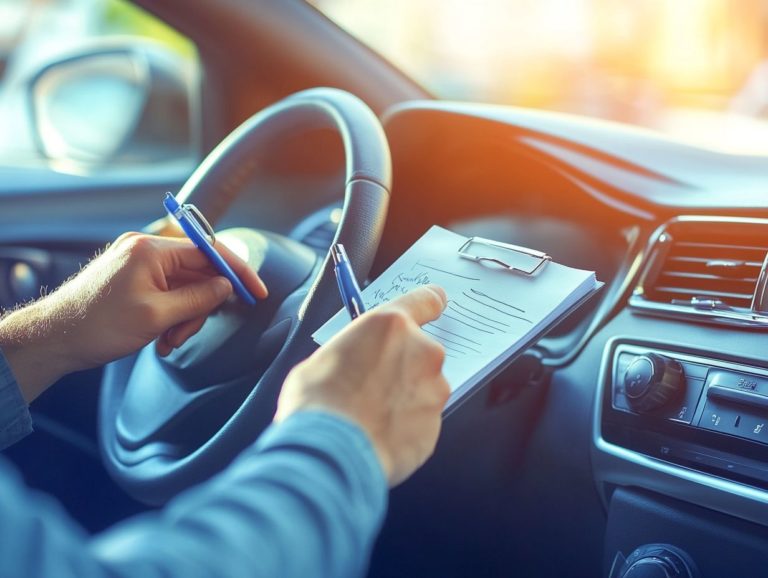What to Know About New Car Depreciation
Understanding car depreciation is crucial for anyone thinking about a new vehicle. The moment you drive off the lot, your car begins to lose value.
This article delves into how depreciation affects resale value. It provides practical tips to help you minimize losses and preserve your car’s worth.
It also addresses the nuances of calculating depreciation for new cars and explores alternatives like used and certified pre-owned vehicles. This ensures you make informed decisions for your next purchase.
Contents
Key Takeaways:

- Car depreciation is the decrease in value over time due to factors like age, mileage, and wear.
- Depreciation can significantly affect resale value; rates vary by make, model, and demand.
- To minimize depreciation, maintain your car and consider used or certified pre-owned options.
Understanding Car Depreciation
Car depreciation is a vital concept that significantly influences your financial decisions when purchasing a vehicle. It represents the decline in a car’s value over time, shaped by various factors such as wear and tear, mileage, and market demand.
Grasping the intricacies of depreciation is essential for anyone considering new or used cars. It directly affects resale value and overall ownership costs.
Understanding how depreciation works can enable you to make informed choices that align with your financial goals.
Definition and Factors Impacting Depreciation
Car depreciation refers to the decline in a vehicle’s value over time. It is influenced by key factors such as driving habits, repair costs, and brand reputation.
Consider how your driving habits can significantly impact how quickly your car loses value. If you frequently embark on long drives or accelerate aggressively, you’re likely contributing to increased wear and tear, which can accelerate depreciation.
On the other hand, vehicles that are well-regarded for their reliability like certain brands celebrated for their durability and low maintenance costs tend to depreciate at a more gradual pace. This has profound implications, not just for new cars as they roll off the dealership lot, but also for used cars.
The resale value of a vehicle can be heavily swayed by previous ownership experiences and the overall perception of its reliability.
How Depreciation Affects Car Value
Understanding how depreciation influences a car’s value is vital for making informed financial decisions. It directly affects both depreciation rates and the resale value of vehicles over time.
Key factors, such as mileage and overall vehicle condition, play significant roles in this evaluation. They help you navigate your car ownership journey with confidence.
Depreciation Rates and Resale Value

Depreciation rates play a crucial role in determining the resale value of vehicles. Resources like Kelley Blue Book and Edmunds are invaluable for you, whether you re a new car buyer or looking to purchase a used one.
These tools equip you to assess the financial implications of a car’s age, condition, mileage, and overall market demand. Factors such as a brand s perceived reliability, market trends, and even economic conditions can significantly affect how quickly a vehicle loses value.
For example, luxury vehicles often depreciate at different rates compared to practical sedans, impacting their desirability in the second-hand market.
By leveraging these comprehensive research platforms, you enable yourself to make informed decisions, ensuring you secure fair pricing whether you re buying a vehicle or preparing to sell your current one.
Ways to Minimize Depreciation
Minimizing depreciation is an essential pursuit for you as a car owner, especially when it comes to safeguarding your investment and preserving your vehicle’s value over time.
Start a proactive maintenance schedule today and watch your car’s value soar! By selecting reliable cars and enhancing fuel economy, you can effectively achieve this goal.
These strategies not only help you maintain your car’s worth but also ensure that your driving experience remains enjoyable and stress-free.
Tips for Maintaining Car Value
To maintain your car’s value, it s vital to embrace practical tips centered around maintenance and safe driving habits. This ensures your vehicle remains in peak condition.
Regular servicing is essential. View scheduling oil changes and tire rotations as wise investments rather than mere expenses. By addressing minor issues such as a small scratch or a dashboard warning light you can avert larger, more costly repairs in the future.
Keep your car spotless, both inside and out. This enhances its appeal and resale value while ensuring that all essential systems function optimally.
Adopting safe driving practices minimizes the risk of accidents and can lead to reduced insurance premiums. Explore the possibility of bundling your insurance policies or seeking discounts for maintaining a clean driving record.
Calculating Depreciation for a New Car
Calculating depreciation for a new car is essential for making smart money choices. It offers valuable insights into how swiftly a vehicle’s value may diminish once you drive off the lot.
By utilizing a depreciation calculator a tool that helps you see how much your car’s value may decrease over time you can gain a clearer understanding of the potential financial implications, taking into account market demand and specific vehicle details.
Factors to Consider

When you’re calculating depreciation, it’s crucial to consider various factors. These include the impact of mileage, the condition of the vehicle, and how these elements contribute to the overall ownership experience.
For example, high mileage often indicates a greater likelihood of wear and tear, significantly diminishing a vehicle’s value over time. The physical characteristics think rust, dents, and the functionality of key components like the engine and brakes are vital in assessing overall condition.
Maintaining regular service records boosts the appeal of your vehicle and helps soften the blow of depreciation. Buyers scrutinize these factors closely before making a purchase, underscoring the importance of keeping your car in top aesthetic and functional shape throughout its lifespan.
Alternative Options to Buying a New Car
Exploring alternative options to purchasing a new car can unveil substantial savings and enhance your understanding of the automobile market.
Delving into used cars and certified pre-owned vehicles which have passed strict inspections to ensure quality presents you with an array of benefits. This allows you to minimize depreciation and overall costs while making a savvy investment.
Exploring Used and Certified Pre-Owned Cars
Exploring used and certified pre-owned cars can be a wise choice if you’re aiming for reliable purchases while keeping depreciation in check.
These vehicles not only come with a more budget-friendly price tag, but they often rival new models in terms of reliability especially if they re certified pre-owned. By investing in a used car, you can enjoy significantly lower depreciation rates compared to new vehicles, which tend to lose value rapidly in those initial years.
When you pair your pre-owned option with a solid maintenance schedule, it can become a faithful and economical transportation solution for years to come. This maximizes the vehicle’s longevity and ensures you receive a strong return on your investment.
Frequently Asked Questions
What to Know About New Car Depreciation?

New car depreciation refers to the decrease in value of a car over time. To better understand this process, it’s important to consider what to know about new car insurance as it can impact your overall financial planning. Here are some key things to know about it.
How quickly does a new car depreciate?
New cars can depreciate by up to 20% in the first year and up to 60% in the first five years. This is due to factors such as market demand, model updates, and wear and tear.
Does the make and model affect depreciation?
Yes, certain makes and models hold their value better than others. Luxury and sports cars tend to have higher depreciation rates, while reliable and popular brands may hold their value longer.
What affects the rate of depreciation?
The main factors that affect depreciation include the car’s condition, mileage, and how much people want a specific make and model.
How can I minimize the impact of depreciation?
You can minimize depreciation by buying a used car instead of a new one.
Choose a make and model known for holding its value. Regular maintenance and keeping your car in good shape also slow down depreciation.
How does depreciation affect car insurance?
As your car loses value, the cost of your insurance may drop too.
Remember, other factors like your driving record and the type of coverage you choose also influence your insurance premium.






